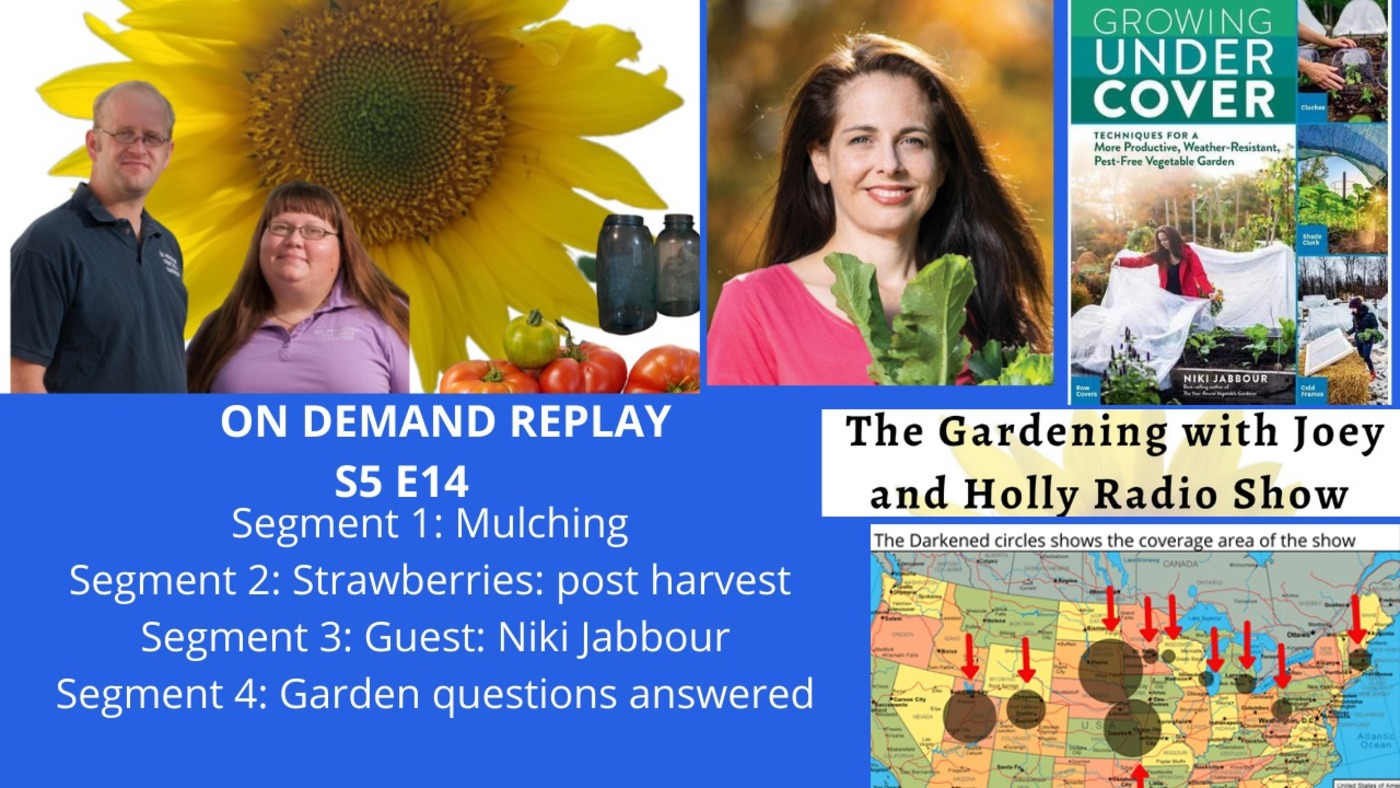S5E14 Mulching, What to do with Strawberries, Guest Niki Jabbour- The Gardening with Joey and Holly Radio show
- Author
- The Gardening with Joey & Holly radio show (The Wisconsin vegetable gardener)
- Published
- Mon 07 Jun 2021
- Episode Link
- https://www.podomatic.com/podcasts/thewisconsinvegetablegardenerpodcast/episodes/2021-06-07T04_00_00-07_00
The gardening with Joey and Holly Radio Show heard weekly March - Oct
our 2021 anonymous Survey Garden survey https://docs.google.com/forms/d/11zLBO6dluGFLbLYqDUw6C3GA88Co39xbOCbOiUy7hVc/edit?gxids=7628
In segment one Joey and Holly talk about Mulching the good and the bad
What does mulch do ?
Organic mulches also improve the condition of the soil. As these mulches slowly decompose, they provide organic matter which helps keep the soil loose. This improves root growth, increases the infiltration of water, and also improves the water-holding capacity of the soil.
Natural mulch
Grass clipping
Leaves
Shredded paper
Straw
Pine needles
Bark & Wood Chips
Black Plastic
If you abhor weeds, one layer of black plastic will help with weed management. Over time the plastic will be broken down by sunlight and must be replaced. It will increase the soil temperature and this should be monitored so that plant roots are not damaged. Often, an organic mulch is applied on top of black plastic to absorb sunlight and prevent overheating of the soil.
Landscape Fabric
Like black plastic, landscape fabric slows weed growth. This product is great under stones and gravel as it will keep rocks from sinking into the soil. It also makes removal of rocks and gravel easier if you decide to change up your landscaping plans. Landscape fabric makes weeding very difficult and is not recommended under organic mulches. It is better to let organic mulches decompose and mix into the soil.
DISADVANTAGES
Because mulch blocks sunlight, it prevents some seeds from germinating. This is good for keeping weeds away from the beds, but not for your good seeds. You can prevent this problem waiting until plants green up before mulching.
Slugs, earwigs, cutworms, and other pests love cool, dark, moist places. To minimize plant-threatening insects, use a thin layer of mulch (about 3 inches), keeping it several inches away from plant bases.
Heavy rains can make the ground soggy for several days. If beds turn into wet, muddy areas, take off the mulch and let the soil dry.
ADVANTAGES
Mulch reduces sun heat damage.
It suppresses weed growth.
Retain moisture. During summer, the soil stays cooler and plant roots don’t stress from the heat.
Reduce soil erosion. Raindrops don’t hit the surface of the ground directly. Also, soil is less likely to splash onto plants, which keeps them cleaner.
Some mulches can insulate crops from extreme temperatures.
Organic mulches provide soil nutrients and encourage beneficial soil organisms and worm activity.
Mulch saves you time, money and, most importantly, water as it slows evaporations, so you don’t have to water as much.
In segment two Joey and Holly talk about what to do with all those strawberries
Post harvest strawberries
Pick your own farm - process quickly
Strawberry jam - pomona pectin
Flash freeze on cookie sheet, then put in freezer bag - label!
Pie filling - cook type clear jel
Strawberry syrup
Strawberry vinegar
Add to a salad
Smoothie
Strawberry baking - muffins, pie, shortcake, cake, etc
In segment three Joey and Holly welcome their guest
Niki Jabbour is a writer, radio show host, year round vegetable gardener, speaker, and award winning author. She's also one of the 3 garden experts from savvygardening.com
1. You are a year round vegetable garden expert, and we'll get to that, but lets talk about your newest book - Growing Under Cover: Techniques for a More Productive, Weather-Resistant, Pest-Free Vegetable Garden - you explain how to use low tunnels, row covers, etc to extend the season and to help with this continual varied weather it seems we all experience - some people may think that wont work for them, how does using simple things like a low tunnel or shade cloth help - what is some of the science there? Especially for those apprehensive to try.
2. You encourage your listeners and readers to try different edible plants than what they normally grow - if so(continued)
